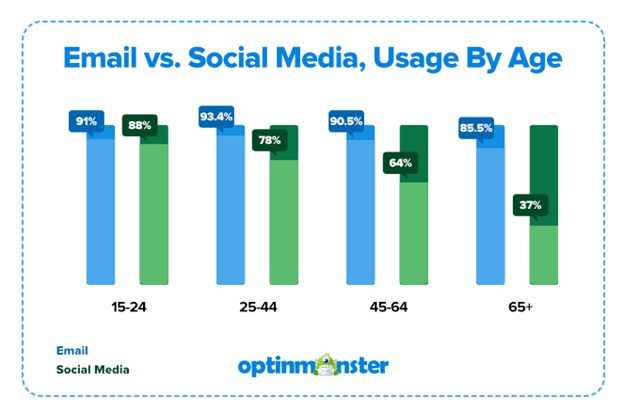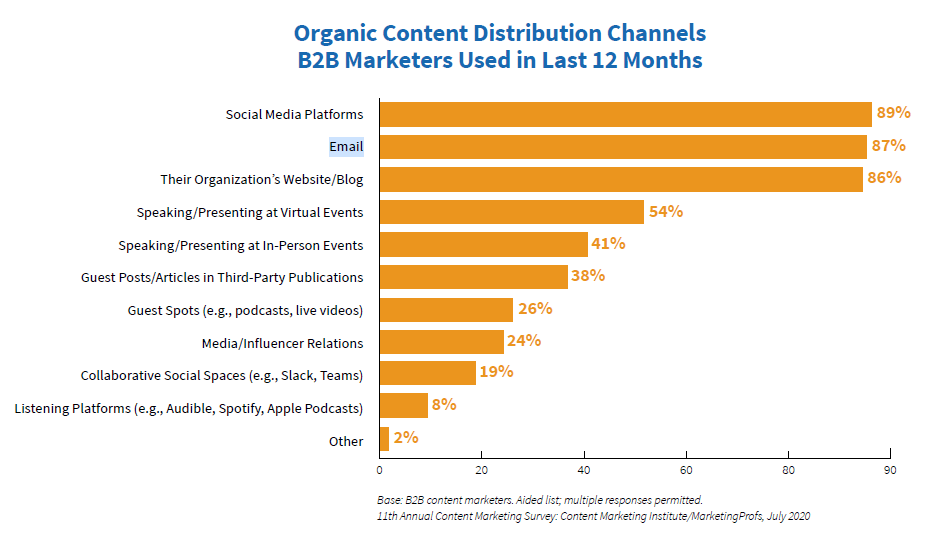12 Powerful Reasons Email Marketing is Still Important [updated 2021]
By Helen McCrone, SEO Copywriter and Content Writer | 1,692 words
Marketing strategy is changing, it seems. According to HubSpot’s State of Marketing Report 2021, this is the year of growing brand authenticity, building relationships, and optimizing the customer experience. That means social media has become numero uno with marketers.
It’s easy to see why. It’s extremely personalized and highly conversational. But where does that leave email marketing?
Not too far behind, actually.
After social media and website, it’s the third most popular marketing channel among B2B and B2C marketers around the world presenting a whole range of industries.
In short, email marketing is still incredibly effective, and it’s not going anywhere soon. Reasons for email marketing's continuing popularity include:
1. It's performing better than ever
2. It has a larger reach than Facebook and Instagram combined
3. It's the preferred channel for permission-based promotional messages
4. It has a higher engagement rate than social media
5. It's better than social media at driving sales
6. It has a really impressive return on investment
7. It's a top three organic content distribution channel
8. It's integral to nurturing customers and prospects
9. It lends itself to perfectly to automation
10. It provides great insight for all your marketing activities
11. It's totally in your control (unlike social media)
12. It's not a flash in the pan
Let's delve into those reasons a little more to see why you should seriously consider including it in your marketing campaigns in 2021 and beyond.

1. Email marketing is performing better than ever
You’d think that, with so many social media channels vying for our attention, email marketing would be unable to compete. Quite the contrary. Apparently, 77% of marketers saw more engagement with email this year than last year—even though they’re sending fewer weekly emails than they used to.
However, the strategy is changing. These days they’re prioritizing segmentation, personalization, and automation. That approach is key to making email marketing much more effective, so take note.
2. Email has a larger reach than Facebook and Instagram combined
There are currently 4.03 billion active email users around the world, according to Statista. Compare that to Facebook, the most popular social network worldwide, which the latest statistics give as 2.7 billion active users. Instagram, another hugely popular platform, has 1.2 billion active users.
And the number of email users is still growing. The increase in smartphone ownership has a lot to do with that. It gives people the chance to email while on the move, something we weren’t doing ten years ago.
By 2025, the number of active email users is expected to rise to 4.48 billion. Now that’s some marketing reach.
3. Email is the preferred channel for permission-based promotional messages
Our fondness for email as a personal communications channel has diminished over recent years, thanks to the rise in direct messaging apps like WhatsApp, Facebook Messenger and WeChat.
But when it comes to marketing communications, email is alive and kicking. That’s due largely to email’s familiarity, flexibility and universality.
Around 77% of us would rather receive permission-based marketing communications in our inbox (versus direct mail, text, phone, or social media). And that preference cuts across all age groups, even those social channel die-hards, the millennials.
It seems that most of us think email is the most appropriate way of sending a marketing message.
Unsurprisingly, the only exception to this is unsolicited commercial messages from unknown senders, otherwise known as SPAM. You don’t need me to tell you that batch-and-blast emails is a no-no for your business.

Email has the largest user base overall and the largest user base of any age group (OptinMonster Dec 2019)
4. Email has a higher engagement rate than social media
Conversion is the ultimate goal for all marketers: turning prospects and leads into paying customers is what it’s all about. But before you convert them, you have to engage them, right? And that’s much easier to do with emails than social media.
One reason is that emails are sent to subscribers. These people, who are a mix of customers and leads, are willing and waiting to hear from you. Emails that reach the inbox of subscribers have an open rate of almost 23% and a click-through rate of almost 4%. Compare that with social media’s overall engagement rate of around 0.5%.
Of course, you need to build a healthy email list in the first place. Fortunately, there are some great lead generation plugins out there to help us do that. These list building solutions are easy to use and don’t require you to be a conversion expert.
Another reason for email’s high conversion rates is the fact that we can easily personalize the content. Emails that are sent with the right content to the right person at the right time significantly boost the chances of conversion.
A study by Experian Marketing Services found that personalized emails deliver six times higher transaction rates and revenue per email than non-personalized email.
5. Emails are better than social media at driving sales
According to OptinMonster, most of us are still hesitant about buying something via social media. Around 60% of consumers say they have made a purchase after receiving a marketing email, whereas only 12.5% would consider clicking on a buy button on social media.
Is it a fear of online purchasing that is creating this hesitation?
Apparently not.
Over 93% of global internet users have bought products online, so it can’t be that. Rather, it’s a lack of trust in ‘social purchase’. We’re happy to conduct ‘social research’ on our smartphones, but when it comes to parting with our hard-earned cash, we’d rather do that instore or through a trusted website.
The average email deliverability across all email service providers is 79.6%.
*EmailToolTester, 2019
6. Email has a really impressive return on investment
Email marketing delivers a mightily impressive ROI of $36 for every dollar spent [State of Marketing 2021]. That’s a little lower than Facebook, but far better than all the other social media channels.
Unless you’re a small business, that is. According to Campaign Monitor, email marketing has the highest return on investment for small businesses.
How does investment in email marketing compare with PPC though? Well, Google estimates that for every $1 a business spends on Google Ads, they receive $8 in profit through Google Search and Ads. I think that’s pretty clear then.
7. Email is a top three organic content distribution channel
The vast majority of B2B marketers still believe in the value of content marketing. At least, that’s what they told the Content Marketing Institute during its 11th B2B Annual Content Marketing Survey. Almost 80% of B2B marketers reported their organization has a content marketing strategy.
The top three organic content distribution channels B2B marketers use are social media platforms (89%), email (87%), and their organization’s website/blog (86%).
The great thing about email is that it can be used for a wide range of content marketing purposes. Whether you’re nurturing leads or conducting a drip campaign, email has proven itself to be adaptable and consistently effective.

Email remains an incredibly popular distribution channel for free content
8. Email is integral to nurturing customers and prospects
If your company does inbound marketing, you know already that email is an essential element of this effective strategy. From welcome messages and order confirmations to subscription reminders and sales announcements, there’s always a good reason to send an email.
No matter where your leads and customers are in the buyer’s journey, email allows you to send appropriate and useful content. And that moves your contacts one step closer to buying, whether it’s for the first time or the tenth time.
9. Email lends itself to perfectly to automation
To send the right email to the right people at the right time (which is what inbound marketing is all about), you need to respond immediately to the online activities of your leads and customers.
And that requires an automated email marketing platform.
Fortunately, you don’t have to be a tech wizard to use an automated email marketing platform. There are some great user-friendly email marketing automated tools out there, and many of them have a free package for lighter users.
But can automated email messages also nurture?
Absolutely!
Nurture emails (a series of emails that tell a story over a period of time) are designed to educate, create brand awareness, and/or encourage someone along the buyer’s journey. Basically, they help your organization create trust and connection.
Just make sure you segment your subscribers. This is key to sending relevant and personalized emails.
Marketers who use segmented campaigns note as much as a 760% increase in revenue.
*Campaign Monitor, 2019
10. Email provides great insight for all your marketing activities
Email marketing is extremely measurable, but did you realize that it’s also a great source of data for all your other marketing activities? Maybe not. A third of marketers haven’t integrated email with their marketing program, which is a missed opportunity.
As Cynthia Price, VP of Marketing at Litmus, explains in Hubspot's State of Marketing Report 2021, many components of your emails can inform other marketing channels. By studying all those clicks and opens on a regular basis, you can gather an awful lot of data for your content creation team.
Cynthia highly recommends setting up monthly meetings with those responsible for marketing channels so you can swap key learnings. This in turn will give you some great insights for your future email campaigns.
11. Email marketing is totally in your control (unlike social media)
If your business invests a heap of time and money in content marketing, there’s no way you want to adjust your marketing strategies every few months. But that’s exactly what you have to do with social media because those darn rules keep changing.
And as any marketer will tell you, it can be a heck of a job keeping up with your chosen platform’s latest algorithms. Facebook, Twitter, Instagram et al are constantly evolving, and those changes can sometimes seriously affect user engagement.
Emails, on the other hand, are in your control.
Completely.
You get to make the rules. You get to decide what sort of content you distribute, who you send it to, how long the email is, and how you segment your contact list.
Cool, huh?
Email marketing couldn't care less about Facebook's changing algorithms. Marketing emails are completely in your control. Helen McCrone, Write for Business.
12. Email is not a flash in the pan
Believe it or not, email has been around for over 40 years. Social media platforms, on the other hand, tend to come and go.
Even those platforms that hit the big time.
Widespread platforms like Friendster. During its prime, Friendster had over 150 million users. What about MySpace, the biggest social network site between 2004-2010? And remember Vine? It had 200 million active users at its peak, until its owner Twitter discontinued the popular mobile standalone app in 2016.
Gone, and now forgotten.
Email, however, is still going strong.
So, the verdict is in. If you’re looking for ways to boost your inbound marketing communications in 2021, look no further than email.
Share this article with colleagues and business partners and spread the word that email marketing is still a sound marketing choice.
Is your business planning to carry out email campaigns in 2021? Tell me what type in the comments below. And if you need a little help with your writing your content, check out my email copywriting service.

